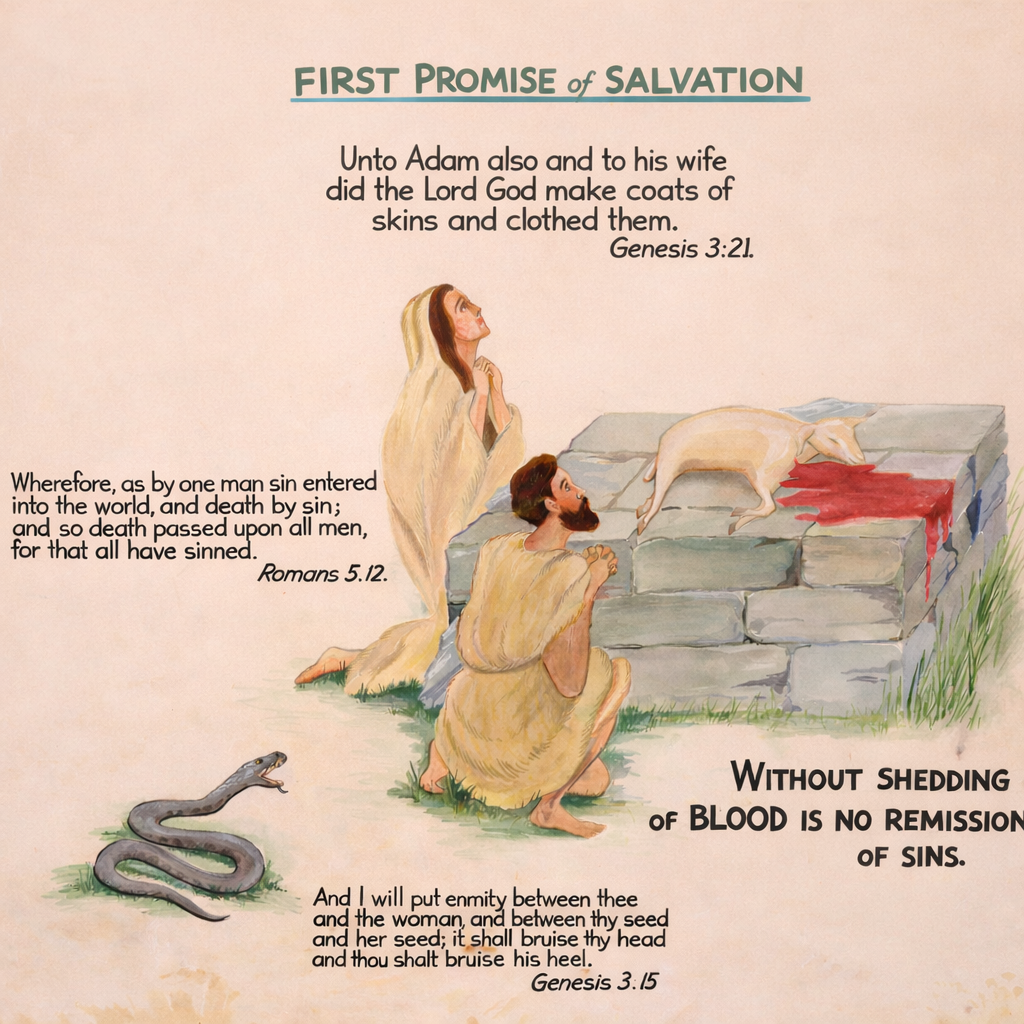The Reason For Animal Sacrifice
God Institutes Sacrifice
When Adam and Eve sinned and realised they were naked, they tried to cover themselves with clothes of fig leaves. Nakedness became a symbol for sin.
Genesis 3:7, 10, Hosea 2:3, Revelation 3:17, 16:15
God made them clothes of skins from a lamb that had been sacrificed. This sacrificed lamb symbolised Jesus Christ who was sacrificed. This provided a true covering for sin of forgiveness and deliverance from mortality.
Genesis 3:21, Revelation 13:8, John 1:29, Psalm 32:1-2
This was Adam and Eve’s first experience of death and it demonstrated the consequences of sin. Blood symbolises life and the shedding of the lamb’s blood demonstrated that death is the just penalty of sin.
Hebrews 9:22, Leviticus 17:11, 14
God instituted sacrifice as the means of acceptable worship to him in the Old Testament. To be forgiven of sins by God, the worshipper identified in faith with the animal by laying their hand on its head, confessed their sins and then shed its blood as an offering to God.
Leviticus 4:27-35
Animal sacrifice in the Old Testament symbolised the sacrifice of Jesus Christ, which is the only sacrifice that can actually take away sin. Animal sacrifices had to be repeated because they could not take away sin like Christ’s sacrifice could. This was because animals, who were amoral, did not show God’s righteousness like Jesus did, who was a mortal man tempted to sin like us but who did not sin.
Hebrews 10:1-4
The Meaning of Sacrifice
Sacrifice was instituted by God as a means of exercising his grace to save mankind from sin and death by making them righteous through faith, without compromising his justice or righteousness. He can therefore be just in showing grace to the unjust who have faith in him, while at the same time upholding his justice in imposing death as the penalty for sin. This is outlined in Romans 3:21-26 about the sacrifice of Christ, which animal sacrifices prefigured.
Romans 3:21-26 (WEY) is a key Bible passage explaining this and is well translated in The New Testament in Modern Speech by Weymouth.
21 But now a righteousness coming from God has been brought to light apart from any Law, both Law and Prophets bearing witness to it—
22 a righteousness coming from God, which depends on faith in Jesus Christ and extends to all who believe. No distinction is made;
23 for all alike have sinned, and all consciously come short of the glory of God,
24 gaining acquittal from guilt by His free unpurchased grace through the deliverance which is found in Christ Jesus.
25 He it is whom God put forward as a Mercy-Seat, rendered efficacious through faith in His blood, in order to demonstrate His righteousness—because of the passing over, in God’s forbearance, of the sins previously committed—
26 with a view to demonstrating, at the present time, His righteousness, that He may be shown to be righteous Himself, and the giver of righteousness to those who believe in Jesus.
Romans 3:21-26
Romans 3:21 - righteousness can only come from God.
Romans 3:22 - God’s purpose is to bring his righteousness upon all who believe by their faith in Jesus Christ
Romans 3:23 - all have sinned and no man has any righteousness of his own Romans 3:10, therefore no one is able to save themself from death.
Romans 3:24 - even though we sin and are unrighteous, God is able to justify (or make us righteous) by his grace and mercy through the redemption (release from sin and death) in Christ’s sacrifice.
Romans 3:25 - God has set Jesus as a propitiation or mercy seat, which is a meeting place between God and man in the law of Moses. This redemption is efficacious to save through faith in his blood because his sacrifice was a demonstration to publicly show God’s righteousness and justice in upholding death as the penalty for sin. This redemption is efficacious to save through faith in his blood, the shedding of which demonstrates the righteousness of God.
Romans 3:26 - If we have faith in the principles of God’s righteousness shown in the sacrifice of Christ, then God can be just and right in showing grace to justify (or make righteous) the unjust who have no righteousness of their own. God can be just in showing grace and mercy by forgiving sins, without compromising his righteousness or justice. When we confess our sins and repent of them we are acknowledging that God is righteous and we are wrong to sin.
Sacrifices is efficacious through faith in the sacrifice of Jesus. On the basis of the offerer’s faith in the principles of God’s righteousness shown in the sacrifice;
God forgives their sins through his forbearance and grace after they confess and repent of their sins.
God will deliver them from mortal human nature with its impulses to sin, by giving them immortality at the judgment seat, if they have been found to have lived a life of faith.
Animal sacrifice taught the moral principles of obeying God and living in faith and righteousness.
1 Samuel 15:22, Psalm 51:16-17, Proverbs 21:3, Jeremiah 7:22-23, Hosea 6:6, Micah 6:6-8

